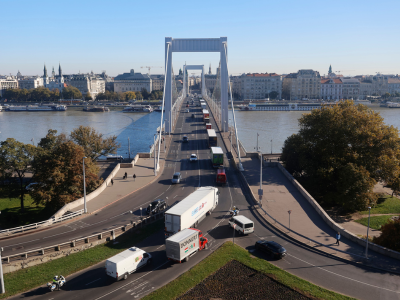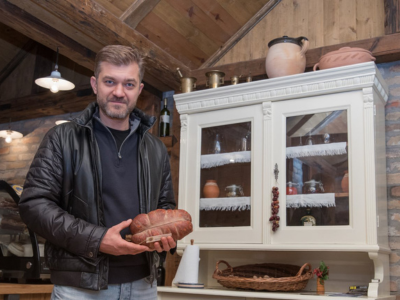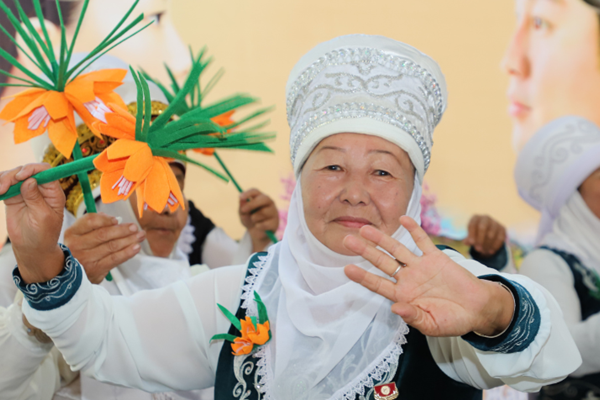Latest Stories
Latest News

World Food Day 2024 celebrated across Europe and Central Asia
31/10/2024
World Food Day is commemorated every year on 16 October, the date FAO was founded in 1945. The theme this year – Right to foods for a better life and a better future – was meant to highlight access to adequate, safe, affordable and nutritious food as a fundamental human right. FAO works to build a just and equitable world in which everyone has a food-secure, nutritious, varied and affordable diet. To highlight this mandate on World Food Day, FAO offices in Europe and Central Asia organized activities of an impressively wide variety in nature, format and scope.

Consensus reached on land consolidation plan in Chiflik, North Macedonia
31/10/2024
On 18 October, the local landowners, by a qualified majority, approved the re-allotment plan, marking Chiflik as the eighth village in North Macedonia to undertake land consolidation. This initiative is part of the European Union-funded “Enhancing Land Consolidation in North Macedonia” project, co-funded and implemented by the Food and Agriculture Organization of the United Nations (FAO), in partnership with the Ministry of Agriculture, Forestry, and Water Economy.

Concerted efforts pay off: Tajikistan joins Rotterdam Convention for a better environment
30/10/2024
For more than a year, FAO has been facilitating and supporting the accession process in Tajikistan under an ongoing pesticide management and disposal project from the Food and Agriculture Organization of the United Nations (FAO) and the Global Environment Facility (GEF) in Central Asia and Türkiye. These efforts have paid off, with the Republic of Tajikistan officially ratifying the Rotterdam Convention on 1 October 2024.

Representatives of the region’s parliaments agree on the need to improve agrifood systems
24/10/2024
Representing 22 national parliaments from across Europe and Central Asia, including both those from the European Union (EU) and non-EU countries, participants at a regional meeting of parliamentarians on agrifood systems have raised their voices for the transformation of rural agrifood systems to be more inclusive and more resilient. After two days of intense and constructive discussions, the regional meeting, hosted by the Speaker of the Parliament of Albania in Tirana, and facilitated by the Food and Agriculture Organization of the United Nations (FAO), concluded yesterday.

Kenjebay Mamyrov and Perizat Nadyrbekova, Kyrgyzstan
21/10/2024
For centuries, camels were indispensable for the people of Kyrgyzstan, a mountainous and landlocked country in Central Asia, where they once carried yurts and belongings for nomadic families traversing the highlands. They also gave them milk, meat, and wool. “The camel can lift the heaviest load” is still a popular saying here, even though most Kyrgyz are sedentary today, with other sources of income. And even the few who still move their livestock to highland pastures in summer, use pickup trucks to get around. As a result, only 260 camels are left today – of some 12 000 that dwelled the Kyrgyz plains around the 1950s.

Comprehensive analysis provides in-depth assessment of agrifood systems in the Black Sea region
17/10/2024
The Food and Agriculture Organization of the United Nations (FAO) has released a flagship report entitled The state of food systems in the Black Sea Economic Cooperation Organization (BSEC) region, offering a detailed analysis of agrifood systems across the Black Sea region, highlighting key trends, challenges and opportunities in 12 countries. The publication was produced under the Black Sea Economic Cooperation Organization Regional Cooperation Centre for Sustainable Food Systems project, which was launched in December 2020 through the FAO–Türkiye Partnership Programme on Food and Agriculture.

World Food Day: An opportunity to rethink the impacts of our daily actions
16/10/2024
Access to diverse, nutritious, affordable and safe food is what we all need for an active and healthy life. This, coupled with intersectoral collaboration and the attributes of a balanced diet, were underscored at today’s joint World Food Day event of the Food and Agriculture Organization of the United Nations (FAO), the Hungarian Food Bank Association, and the Ministry of Agriculture of Hungary in Budapest. The highlights of the event were the arrival of 30 000 kilos of food donations, delivered by a convoy of trucks, and the preparation and sharing of sustainable and affordable dishes from famous Hungarian chefs.

FAO: Rural women are key to building resilience in agrarian areas
15/10/2024
The role of women in agriculture and rural livelihoods and the opportunities for their economic participation, financial inclusion, and contribution to climate resilience is the central theme of a roundtable discussion that will take place today in Sarajevo, Bosnia and Herzegovina. The event is part of the project “Women driving resilience in agriculture and rural areas,” implemented by UN Women and the Food and Agriculture Organization of the United Nations (FAO) with support from Sweden. The roundtable discussion is scheduled for 15 October, the International Day of Rural Women for which this year’s theme is the role of rural women in conserving and protecting nature for our collective future.

FAO technical Commission reviews current issues of European fisheries and aquaculture sectors
11/10/2024
The week of 7–11 October has been all about the European fisheries and aquaculture sectors in Pula, Croatia with the international symposium, "Building a sustainable future for inland fisheries and aquaculture in a time of multiple stressors" and the 32nd Session of the European Inland Fisheries and Aquaculture Advisory Commission (EIFAAC), held in back-to-back succession. The events brought together 120 policy makers and scientists who looked at the status and trends in European inland fisheries, potential for aquaculture growth, and the sectors’ sustainable future in a time of multiple stressors.

From Baranja to the world
07/10/2024
For nearly 120 years, farmers in the northeastern region of modern-day Croatia have been making and enjoying artisanal dried sausage from high-quality local pork. Traditionally eaten on special occasions and often included in holiday gift baskets, Baranjski kulen (Croatian for a delicatessen sausage from the Baranja region) is now gaining popularity as an international delicacy. That's in no small part thanks to the Food and Agriculture Organization of the United Nations (FAO) and the European Bank for Reconstruction and Development (EBRD) who worked with the Croatian government to help Baranjski kulen gain its Protected Geographical Indication (PGI) status from the European Union (EU) over 10 years ago.


